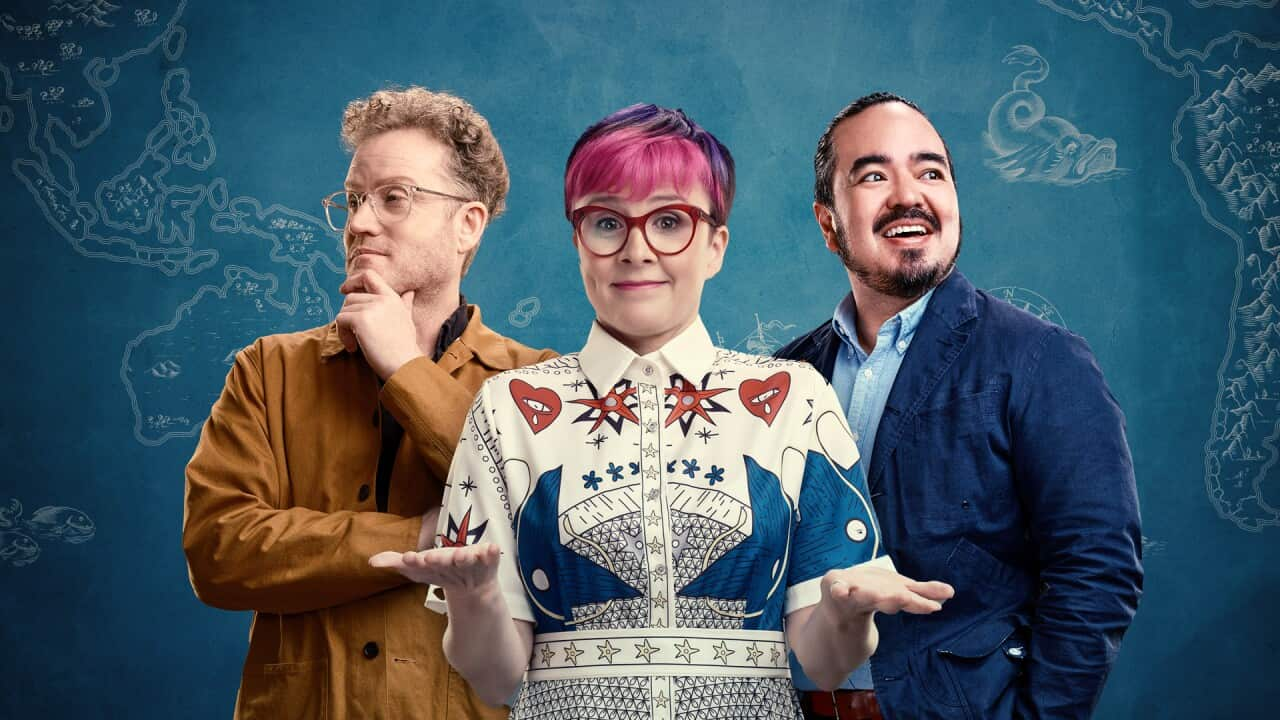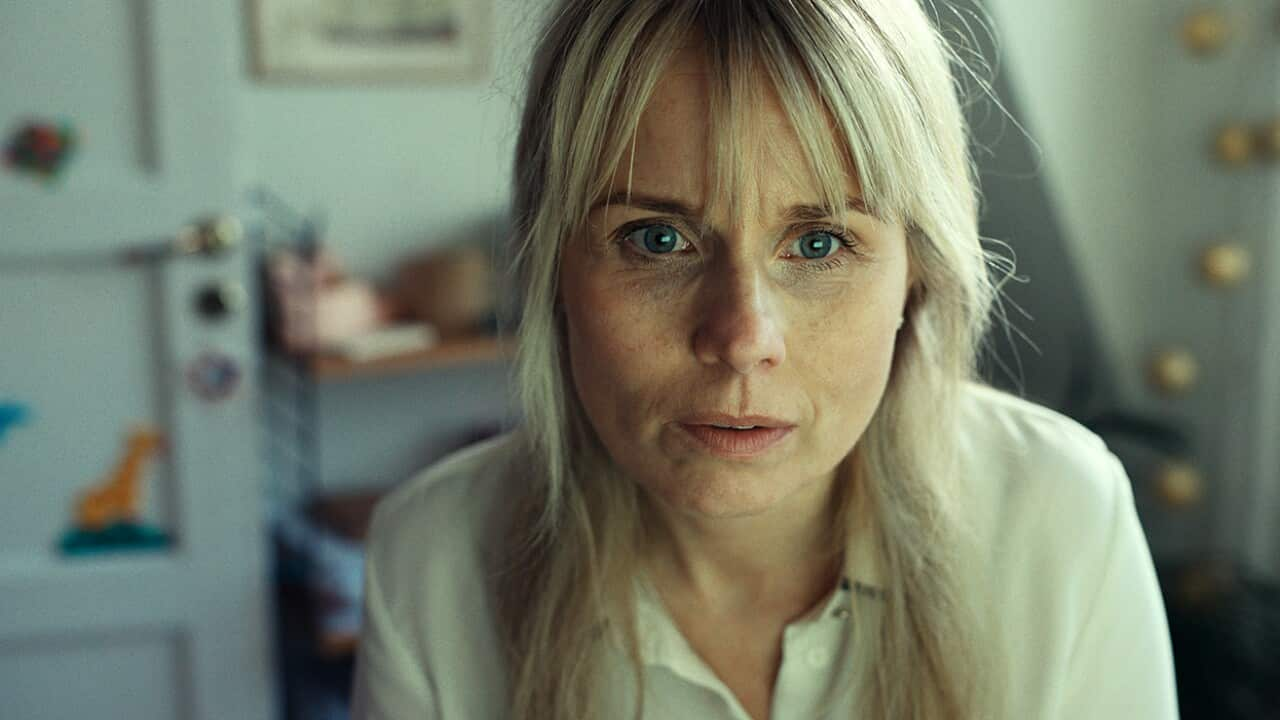Denis Marković (Denis Murić) is so talented a football player he barely trains. He’s also a wild child. When we first meet him, he’s on the field, doing what he does best. He scores a beautiful goal, bendy and precise, flying into the corner of the net at speed. But his celebratory action is inappropriate enough to receive a red card.
Off the field, he’s loose, partying so hard and behaving so flippantly, it’s hard to believe he can keep it together enough to play as well as he does.
His red carded act puts his manager, Čaki (subtitled as Chucky, as it’s pronounced) in a meeting where he’s given a personal cash deal that ensures the club sees the back of both him and his troublesome young charge.

The ‘Golden Boy’ Denis Marković (Denis Murić). Credit: Luka Milićević
Denis, nicknamed Denjo, is arrogant enough to believe it’ll be easy for Čaki (Andrija Kuzmanović, Toma) to secure him a spot at another club – “I’m the new Maradona” – but with his behaviour hardly offering a classy image, only one top division club is willing to take him. He rejects it, insulted that clubs aren’t fighting over him, as he’d expected.
The relationship between Čaki and Denjo is fraught, but there is much love there. The pair share a long history and we see snippets of it as the drama unfolds. We learn that Denjo’s grown up in a home without a stable childhood. Čaki discovered Denjo’s talent as a youngster and took him on as manager.
Other than Čaki, Denjo trusts so few people – there’s Sara (Jovana Gavrilović, Radio Mileva), with whom he grew up in the home and whom he adores, his girlfriend Dijana (Alisa Radaković) and his mate Vlada (Vladimir Kovačević), the kind of pal who pays his nightclub bills when Čaki’s purse has run dry.

Dijana (Alisa Radaković) with Denis (Denis Murić). Credit: Luka Milićević
Čaki has been in his corner for long enough that Denjo gets away with treating him with disrespect like the entitled big-headed brat he is. But Čaki has a gambling problem. And that soon becomes Denjo’s problem – when Čaki loses the cash he owes a pair of brothers who happen to be big-wigs in Belgrade’s underworld, he hands them Denjo as a way to clear his debts, and keep himself alive.
The brothers – Soni (Petar Strugar) and Džoni (subtitled as Johnny) – are an interesting pair. Džoni (Ljubomir Bulajić) is a hothead, a leather-jacket wearing sook who thinks he’s intimidating, but you get the feeling people are sniggering at him rather than quaking in his presence. Soni is clean-cut, always sporting a sharp suit and brings a cool, calm control that’s unnerving. He actually is intimidating.

Džoni (Ljubomir Bulajić) and Soni (Petar Strugar). Credit: Luka Milićević
They run a building development racket as well as being in the nightclub and other businesses. Džoni has no interest in Denjo but Soni sees a future in him.
“You lack foresight, Johnny. Don’t you get it? The kid’s a gold mine. Even out of form, he’s better than most. I’m done with money-lending. I’m fed up with junkies, gamblers and degenerates. Leave the kid to me.”
After installing Denjo in a modern mansion on the outskirts of Belgrade, Soni hires Maki, fresh out of jail, to be his keeper. Maki (Igor Benčina, ) – also very intimidating – must prepare Denjo for life as a major football star, like it or not. He rudely wakens Denjo from his hangovers and forces him to train, touches of violence ever present.

Denis (Denis Murić) training with Maki (Igor Benčina). Credit: Luka Milićević
So how is our zlatni dečko, our golden boy, handling all this mayhem?
Denjo is at a cross-roads. He wants out of football, but has no other skills and no other plan. Dijana has kicked him out and Sara has moved to Munich to further her career. Čaki’s sold him to gangsters. He’s completely stranded, abandoned, yet again.
It’s a fascinating starting point for a young man we ultimately want the best for, despite his immense ego. We see his pain and the effects a lack of guidance from a stable and caring adult have had on him. While Čaki was there for him, his addiction issues have forced Denjo into having to pay for his mistakes. He’s strong-armed into fulfilling his potential just as those few people closest to him dwindle away. (He still has Vlada, but the bloke is terrified of Maki, and keeps his distance.)

Denis (Denis Murić). Credit: Luka Milićević
There is a real desire to see Denjo step into his own, recognise he has himself to rely on when others leave him. There is the broken relationship with Čaki you want to see put back together – Čaki is a shadow of a man without his football star charge. He’s humiliated, down and out, without purpose. Will he find a way to kick the gambling addiction, bring himself back on track and back into Denjo’s life? You want the pair of them to get out from under the heavy thumb of the brothers, who so easily control their lives, it’s infuriating.
And with Denjo’s egomaniacal naivete and Maki’s violent undercurrent, how will this odd couple move forward as athlete and trainer? Will Denjo find a club willing to risk their reputation to take him on? Will he find an appreciation for his talent and take the opportunity to play at the top level if it’s presented to him again?

Denis (Denis Murić) and Čaki (Andrija Kuzmanović). Credit: Luka Milićević
It’s hard to tell what will happen with our golden boy, especially as Soni isn’t the only one to be attracted by his lucrative talent. We’re eager to find out, and as Denjo brings potential in spades, not just with his career but also with his character development, we’re in the stands cheering for him all the way to come good.
We don’t see much content out of Serbia on our screens and deserve to see more. (If you have the stomach for it, also check out the very noir , now streaming at SBS On Demand; look out for Benčina who plays a priest.)

Soni (Petar Strugar) and Džoni (Ljubomir Bulajić). Credit: Luka Milićević
Golden Boy is outstanding. The performances from the accomplished ensemble cast are so good, you forget you’re watching fiction (albeit, like Black Wedding, Golden Boy is inspired by true events). The soundtrack is a real plus as well, and happily, the main women characters are given full personalities and back stories. Substance abounds here.
Co-written by Vuk Ršumović (No One’s Child), screenwriter Aleksa Ršumović and series’ director Ognjen Janković, a version was also released, Janković’s debut. The five-part series has been for a host of awards, including Best Drama Series, Best Leading Actress for Gavrilović (who also appears in Celts, a Serbian film coming soon to SBS), Best Supporting Actor for Benčina and Best Leading Actor/Rising Star for Murić at the Sarajevo Film Festival where it premiered last year. Awards will be announced in August.
Here’s to more such quality from the Serbian corner of southern Europe.
STREAM FREE AT SBS ON DEMAND

Golden Boy - episode 1
MORE TO WATCH

Top new series in July 2023




